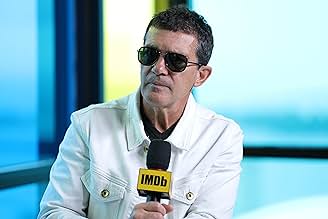A film director reflects on the choices he's made in life as the past and present come crashing down around him.A film director reflects on the choices he's made in life as the past and present come crashing down around him.A film director reflects on the choices he's made in life as the past and present come crashing down around him.
- Nominated for 2 Oscars
- 71 wins & 178 nominations total
- Director
- Writer
- All cast & crew
- Production, box office & more at IMDbPro
Featured reviews
Less bombastic than some of his previous work (which I also love, by the way), this bittersweet film shows the maturity of a director that's been around and seen it all, someone who's experienced both pain and glory and is asking himself what's next in life. In this partly autobiographical narrative, his most personal so far, Almodovar expresses some frustration with aging and with loneliness, but also his appreciation for the path that he's had the privilege to make for himself and continues to work on, and the people who are important to him. He succeeds in exploring nostalgia without succumbing to sappiness. If anything, Almodovar's senses and craft are sharper than ever. He's able to be critical and loving at the same time. I like how has evolved through the decades and that he keeps experimenting with different styles of storytelling.
Antonio Banderas' award-worthy performance as the director's alter ego is understated, yet bold. Almodovar said in an interview that the choice was obvious, as Banderas is to him what Marcello Mastroianni was to Federico Fellini. And indeed there are some similarities between this film and '8 1/2': both films deal with the creative process. But whereas Fellini approaches the topic as a gladiator confronting obstacles with whip in hand, Almodovar is more low key and seems to point to tenderness as his weapon of choice.
It is a slow film, similar to life. I really enjoyed this movie, no one is clear what it is about until about and hour in. In simple terms is is film director who had lost his mojo because of the death of his mother and a back operations. He also begins to look back on his career and pivotal moments in his childhood. The flashback shots are perfectly and wonderfully capture the atmosphere of his young life while seamlessly interwoven with moments of present day.
Pain and glory is painful and glorious, as you'd except from a director who lives, suffers, enjoys and jogs his memory to find the small and grand moments of his human existence.
The acting of everyone was brilliant but limited so no Oscar here, Almodovar and Banderas are such a good match, the boy and the painter is such a delicate combination & the mother and the son in different moments of their lives, but mainly in the end, when they are both old. the dialogues are very meaningful, but movie as a whole had some profundity and was ravishingly shot as usual.
Pain and glory is painful and glorious, as you'd except from a director who lives, suffers, enjoys and jogs his memory to find the small and grand moments of his human existence.
The acting of everyone was brilliant but limited so no Oscar here, Almodovar and Banderas are such a good match, the boy and the painter is such a delicate combination & the mother and the son in different moments of their lives, but mainly in the end, when they are both old. the dialogues are very meaningful, but movie as a whole had some profundity and was ravishingly shot as usual.
A filmmaker (Antonio Banderas) deals with physical and mental ailments as he approaches old age, settling in to a sad kind of torpor as he reflects on life. People have come and gone and the real pain here seems to be quiet melancholy of regret, his body's (significant) issues notwithstanding. The film meanders a bit and suffers at times with pacing, but through his reflections and flashbacks, it tells a touching story about coming to peace with those we've known in life.
There's the filmmaker's mother (Penélope Cruz), who sent him to a seminary for most of his schooling because she had no money for a secular education, which led to him not learning much. In old age she dies alone in a hospital instead of in her home village, where he had promised to take her. (Oddly, the actor playing the elderly mother, Julieta Serrano, has blue eyes whereas Cruz's are brown, which was a little jarring to me). These are the things that swirl around in his mind as he still grieves over losing her.
There is also the actor from one of his popular films (Asier Etxeandia), who he had a falling out with decades ago, but who he reconnects with and is then introduced to heroin by. He casually tries it and then alarmingly we see him quickly hooked, which makes for what seemed like one of the longer subplots, which I wasn't all that interested in. There is an old lover who surfaces (Leonardo Sbaraglia), a man who disappeared out of his life and is now married with children, and the scene the two share is full of authenticity and warmth. He also recalls a time in childhood when he tutored a handyman for payment of services to his mother, and felt the first flush of desire when he saw him bathing.
I think Almodóvar was wise to draw a line at this last character not physically meeting him decades later, as it gave the film realism and a wistful bit of sentimentality. True to form, he also gives the viewer an explosion of primary colors, and there is certainly a lot of beauty on the screen. That kitchen, especially with its bold red cabinets, made me wonder if such a space would be too loud to live in, but later I read that it was modeled on Almodóvar's own home. I also loved the little touch of the Cruz's character and her friends breaking in to a light song while washing their clothes in the river. Nothing "big" happens here, but in its quiet way, it reflects the director, and his pain and glory in life.
There's the filmmaker's mother (Penélope Cruz), who sent him to a seminary for most of his schooling because she had no money for a secular education, which led to him not learning much. In old age she dies alone in a hospital instead of in her home village, where he had promised to take her. (Oddly, the actor playing the elderly mother, Julieta Serrano, has blue eyes whereas Cruz's are brown, which was a little jarring to me). These are the things that swirl around in his mind as he still grieves over losing her.
There is also the actor from one of his popular films (Asier Etxeandia), who he had a falling out with decades ago, but who he reconnects with and is then introduced to heroin by. He casually tries it and then alarmingly we see him quickly hooked, which makes for what seemed like one of the longer subplots, which I wasn't all that interested in. There is an old lover who surfaces (Leonardo Sbaraglia), a man who disappeared out of his life and is now married with children, and the scene the two share is full of authenticity and warmth. He also recalls a time in childhood when he tutored a handyman for payment of services to his mother, and felt the first flush of desire when he saw him bathing.
I think Almodóvar was wise to draw a line at this last character not physically meeting him decades later, as it gave the film realism and a wistful bit of sentimentality. True to form, he also gives the viewer an explosion of primary colors, and there is certainly a lot of beauty on the screen. That kitchen, especially with its bold red cabinets, made me wonder if such a space would be too loud to live in, but later I read that it was modeled on Almodóvar's own home. I also loved the little touch of the Cruz's character and her friends breaking in to a light song while washing their clothes in the river. Nothing "big" happens here, but in its quiet way, it reflects the director, and his pain and glory in life.
I. Short review:
Half autobiographic, half fiction, Almodóvar's most intimate work is an european drama carved with humor and intense emotions you wouldn't want to miss, Antonio Banderas is a tour de force.
II. Full review:
Since this year's Cannes Film Festival celebration in which Pain and Glory competed for the Palm d'Or for best picture and supposedly the favorite to win, I took quite interest in Almodóvar's new film, also my personal experiences with two of his films that I've seen, 'Talk to Her' (which I think is an absolute masterpiece), and the very creative thriller 'The Skin I Live In' (also starring Antonio Banderas), were strong factors of that interest.
The film tells the story of a depressed and aching director that reconnects with old friends and people he used to care about, at the time that he reflects on his humble but enlightning past in several ways, all from the perspective of his gloomy and lonesome present.
Pain and Glory escalates in a ladder of triumphs, since its mesmerizing soundtrack by Alberto Iglesias (Tinker Tailor Soldier Spy), an astonishing cinematography by José Luis Alcaine, a masterful direction and gripping script by Pedro Almodóvar, to its top and greatest gift of all: a colossal performance by Antonio Banderas, which justifies his award for best actor in Cannes 2019.
Half autobiographic, half fiction, Almodóvar's most intimate work is an european drama carved with humor and intense emotions you wouldn't want to miss, Antonio Banderas is a tour de force.
II. Full review:
Since this year's Cannes Film Festival celebration in which Pain and Glory competed for the Palm d'Or for best picture and supposedly the favorite to win, I took quite interest in Almodóvar's new film, also my personal experiences with two of his films that I've seen, 'Talk to Her' (which I think is an absolute masterpiece), and the very creative thriller 'The Skin I Live In' (also starring Antonio Banderas), were strong factors of that interest.
The film tells the story of a depressed and aching director that reconnects with old friends and people he used to care about, at the time that he reflects on his humble but enlightning past in several ways, all from the perspective of his gloomy and lonesome present.
Pain and Glory escalates in a ladder of triumphs, since its mesmerizing soundtrack by Alberto Iglesias (Tinker Tailor Soldier Spy), an astonishing cinematography by José Luis Alcaine, a masterful direction and gripping script by Pedro Almodóvar, to its top and greatest gift of all: a colossal performance by Antonio Banderas, which justifies his award for best actor in Cannes 2019.
As Salvador (exquisitely played by Antonio Banderas) says in the movie "A great actor is not the one who cries, but the one who knows how to contain the tears" and I think that describes the movie perfectly, you feel the pain in every scene but never get the chance to let that emotion overcome, it's a beautiful and raw portrayal of life in a way we've never seen Almodóvar do before, the film breathes a diaphanous simplicity and spontaneity, far from what we're used to see from the filmmaker. Every aspect of this movie felt very personal and intimate, almost like reading someone's diary while it's being written or someone sharing a part of their soul, i'm sure this movie wasn't easy to make.
This is a story about pain, sadness, solitude, self discovery, forgiveness and regret but most of all, it's a movie about overcoming and I honestly feel this is one of his best works in recent years.
This is a story about pain, sadness, solitude, self discovery, forgiveness and regret but most of all, it's a movie about overcoming and I honestly feel this is one of his best works in recent years.
Did you know
- TriviaJulieta Serrano and Antonio Banderas already played mother and son, more than 30 years before, in another two movies by Pedro Almodóvar: Women on the Verge of a Nervous Breakdown (1988) and Matador (1986)
- GoofsThe eye color of Penelope Cruz (Antonio's young mother) are brown while the old mother's are pale blue. In the very last scene of the film, it appears that Penelope Cruz is an actress who plays Antonio Banderas's young mother while filming a scene in front of him.
- Quotes
Salvador Mallo: The nights that coincide several pains, those nights I believe in God and I pray to him. The days when I only suffer a type of pain I'm an atheist.
- ConnectionsFeatured in 2020 Golden Globe Awards (2020)
- SoundtracksA tu vera
Written by Juan Solano (as Juan Solano Pedrero) and Rafael de León (as Rafael de Leon Arias de Saavedra)
Performed by Rosalía and Penélope Cruz
- How long is Pain and Glory?Powered by Alexa
Details
- Release date
- Countries of origin
- Official sites
- Language
- Also known as
- Đau Đớn Và Vinh Quang
- Filming locations
- Paterna, Valencia, Comunidad Valenciana, Spain(underground dwelling)
- Production companies
- See more company credits at IMDbPro
Box office
- Gross US & Canada
- $4,567,338
- Opening weekend US & Canada
- $152,636
- Oct 6, 2019
- Gross worldwide
- $37,359,689
- Runtime
- 1h 53m(113 min)
- Color
- Sound mix
- Aspect ratio
- 1.85 : 1
Contribute to this page
Suggest an edit or add missing content


![Tráiler 2 [OV]](https://m.media-amazon.com/images/M/MV5BYWViMTBkNDgtOGM3Yi00YmFhLTk2OTItYWY5ZDJlODg0NGY4XkEyXkFqcGdeQXRyYW5zY29kZS13b3JrZmxvdw@@._V1_QL75_UX500_CR0)
![Tráiler [OV]](https://m.media-amazon.com/images/M/MV5BOGQ1YmRmNjUtMjVmYy00NDAxLThhNmEtMGNjNTIzZmQ2ZTcxXkEyXkFqcGdeQXRyYW5zY29kZS13b3JrZmxvdw@@._V1_QL75_UX500_CR0)






































